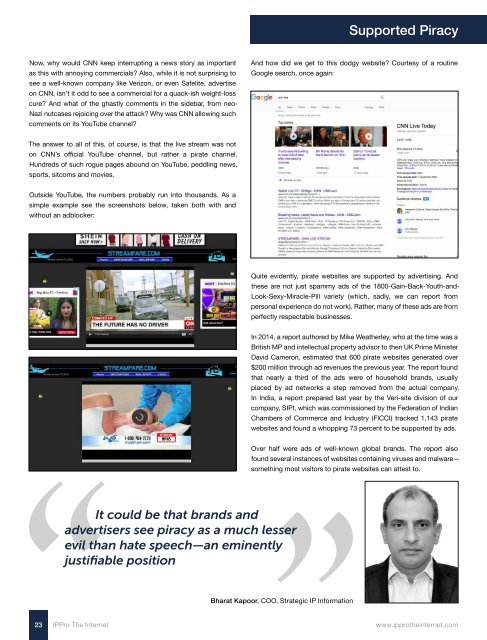IPPro The Internet Issue 140
In this issue Matthew Bassiur, head of IP enforcement at Alibaba, gives an update of the e-commerce company’s enforcement efforts.
In this issue Matthew Bassiur, head of IP enforcement at Alibaba, gives an update of the e-commerce company’s enforcement efforts.
Create successful ePaper yourself
Turn your PDF publications into a flip-book with our unique Google optimized e-Paper software.
Supported Piracy<br />
Now, why would CNN keep interrupting a news story as important<br />
as this with annoying commercials? Also, while it is not surprising to<br />
see a well-known company like Verizon, or even Safelite, advertise<br />
on CNN, isn’t it odd to see a commercial for a quack-ish weight-loss<br />
cure? And what of the ghastly comments in the sidebar, from neo-<br />
Nazi nutcases rejoicing over the attack? Why was CNN allowing such<br />
comments on its YouTube channel?<br />
And how did we get to this dodgy website? Courtesy of a routine<br />
Google search, once again:<br />
<strong>The</strong> answer to all of this, of course, is that the live stream was not<br />
on CNN’s official YouTube channel, but rather a pirate channel.<br />
Hundreds of such rogue pages abound on YouTube, peddling news,<br />
sports, sitcoms and movies.<br />
Outside YouTube, the numbers probably run into thousands. As a<br />
simple example see the screenshots below, taken both with and<br />
without an adblocker:<br />
Quite evidently, pirate websites are supported by advertising. And<br />
these are not just spammy ads of the 1800-Gain-Back-Youth-and-<br />
Look-Sexy-Miracle-Pill variety (which, sadly, we can report from<br />
personal experience do not work). Rather, many of these ads are from<br />
perfectly respectable businesses.<br />
In 2014, a report authored by Mike Weatherley, who at the time was a<br />
British MP and intellectual property advisor to then UK Prime Minister<br />
David Cameron, estimated that 600 pirate websites generated over<br />
$200 million through ad revenues the previous year. <strong>The</strong> report found<br />
that nearly a third of the ads were of household brands, usually<br />
placed by ad networks a step removed from the actual company.<br />
In India, a report prepared last year by the Veri-site division of our<br />
company, SIPI, which was commissioned by the Federation of Indian<br />
Chambers of Commerce and Industry (FICCI) tracked 1,143 pirate<br />
websites and found a whopping 73 percent to be supported by ads.<br />
Over half were ads of well-known global brands. <strong>The</strong> report also<br />
found several instances of websites containing viruses and malware—<br />
something most visitors to pirate websites can attest to.<br />
It could be that brands and<br />
advertisers see piracy as a much lesser<br />
evil than hate speech—an eminently<br />
justifiable position<br />
Bharat Kapoor, COO, Strategic IP Information<br />
23 <strong>IPPro</strong> <strong>The</strong> <strong>Internet</strong> www.ipprotheinternet.com







